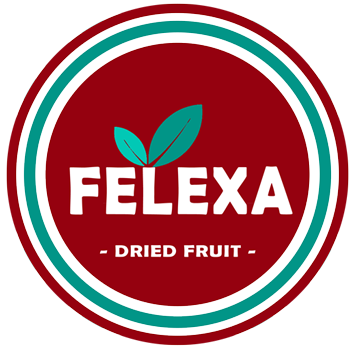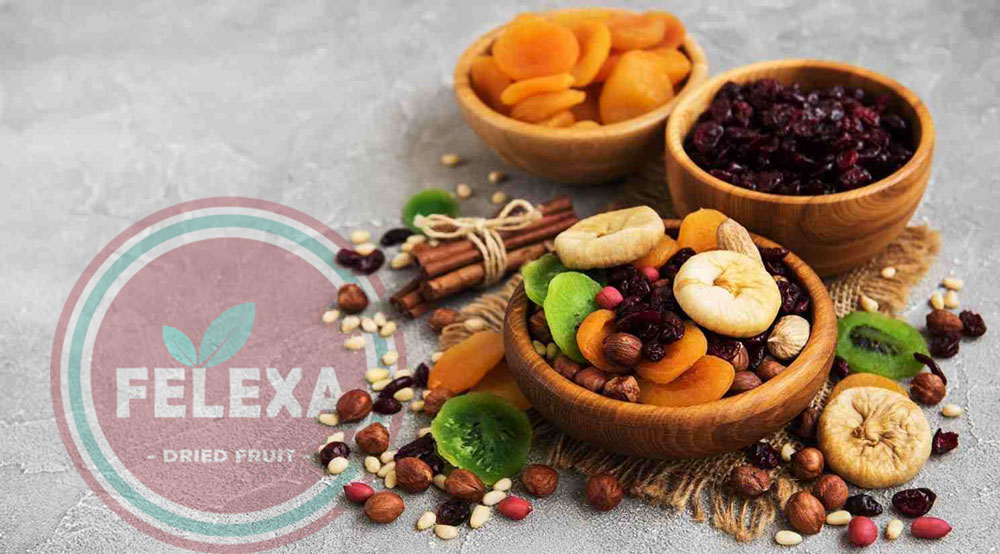Welcome to Felexa’s exploration of the world’s most luxurious dried fruits! As connoisseurs of premium Persian dried fruits, we’re excited to take you on a journey through the rare and exquisite delicacies that command top prices in the global market. From rare varieties to labor-intensive production processes, these dried fruits offer a taste of indulgence like no other. Let’s uncover the top 13+1 most expensive dried fruits in the world:
- Iranian Saffron: Known as the “red gold,” Iranian saffron tops the list as one of the most expensive dried fruits globally. Saffron threads are handpicked from the delicate Crocus sativus flower, making it a labor-intensive and time-consuming process. Renowned for its distinct flavor, aroma, and vibrant color, Iranian saffron is a prized ingredient in gourmet cuisine and luxury products.
- Medjoul Dates: Renowned for their rich, caramel-like flavor and creamy texture, Medjoul dates are a staple of Middle Eastern cuisine and a symbol of hospitality. Dried Medjoul dates are prized for their exceptional quality and superior taste, making them a coveted delicacy among connoisseurs of fine dried fruits. Grown in select regions with optimal climatic conditions, Medjool dates are handpicked and carefully dried to preserve their natural sweetness and flavor profile, making them a coveted delicacy among discerning consumers.
- Japanese Dried Persimmons (Hoshigaki): Hoshigaki, or Japanese dried persimmons, are a traditional delicacy made through a meticulous process of hand-peeling, hanging, and massaging the fruit to enhance its sweetness and texture. This artisanal method results in tender, honey-like persimmons with a unique flavor profile that commands premium prices in gourmet markets worldwide.
- Turkish Mulberries: Renowned for their rich, sweet flavor and chewy texture, Turkish mulberries are prized for their superior quality and nutritional value. Handpicked and sun-dried to perfection, these antioxidant-rich gems are a favorite among health-conscious consumers and culinary enthusiasts alike, making them one of the most sought-after dried fruits on the market.
- Greek Corinth Currants: Originating from the ancient city of Corinth in Greece, Corinth currants are small, seedless dried grapes prized for their intense sweetness and rich flavor profile. Handpicked and sun-dried on traditional wooden trays, these exquisite currants are a staple ingredient in Mediterranean cuisine and gourmet desserts, commanding premium prices for their superior quality.
- Italian Amarena Cherries: From the sun-drenched orchards of Italy comes the prized Amarena cherry, renowned for its intense flavor and luxurious texture. Dried to perfection, these cherries boast a deep, ruby-red hue and a sweet-tart taste that is truly irresistible. With their limited availability and exquisite taste, Italian Amarena cherries command a premium price among discerning enthusiasts.
- Persian Dried Figs (Anjeer): Known for their luscious sweetness and chewy texture, Persian dried figs, or Anjeer, are prized for their superior quality and flavor. Grown in the fertile valleys of Iran, these figs are handpicked and sun-dried to perfection, resulting in tender, honey-like fruits with a rich, nutty taste. A favorite in Middle Eastern cuisine and gourmet confections, Persian dried figs are a luxurious treat for the senses.
- Chinese Goji Berries (Wolfberries): Revered for their potent antioxidant properties and sweet-tart flavor, Chinese goji berries, also known as wolfberries, have been prized in traditional Chinese medicine for centuries. Handpicked from the lush Ningxia region of China, these nutrient-rich berries are sun-dried to preserve their nutritional potency, making them a prized superfood in health and wellness circles worldwide.
- South African Cape Gooseberries: Also known as physalis or golden berries, South African Cape gooseberries are cherished for their tangy-sweet flavor and vibrant golden hue. Grown in the sun-kissed landscapes of South Africa, these exotic berries are handpicked and carefully dried to preserve their natural sweetness and nutritional goodness, making them a rare and luxurious treat for gourmet palates.
- Australian Macadamia Nuts: While technically not a dried fruit, Australian macadamia nuts deserve a place on our list for their exceptional taste and nutritional value. Renowned for their buttery flavor and creamy texture, these premium nuts are grown in the pristine rainforests of Australia and carefully harvested and dried to perfection. Packed with heart-healthy fats, vitamins, and minerals, Australian macadamia nuts are a luxurious indulgence that commands premium prices in global markets.
- Japanese Yubari King Melon: Hailing from the lush fields of Hokkaido, Japan, the Yubari King Melon is a symbol of luxury and indulgence. Dried to perfection, each bite offers a burst of sweet, succulent flavor that tantalizes the taste buds. With its limited availability and exceptional quality, Yubari King Melon holds a special place among the world’s most expensive dried fruits.
- Spanish Marcona Almonds: Known as the “queen of almonds,” Marcona almonds are native to the fertile soils of Spain and prized for their buttery texture and delicate flavor. Dried Marcona almonds are a luxurious snack enjoyed by discerning palates around the world, making them a must-have for those seeking the finest dried fruits money can buy.
- Australian Kakadu Plums: Native to the remote regions of Australia, Kakadu plums are revered for their exceptionally high vitamin C content and potent antioxidant properties. Dried Kakadu plums offer a unique combination of tangy-sweet flavor and nutritional benefits, making them a sought-after delicacy among health-conscious consumers willing to pay top dollar for superior quality.
- +1 Iranian Pistachios: Renowned for their vibrant green color and exceptional taste, Iranian pistachios are among the finest in the world. Cultivated in the arid regions of Iran, particularly in Kerman province, Iranian pistachios are prized for their large size, superior flavor and distinctively thin shells.
From the rarest Persian saffron to the exotic Cape gooseberries, these top 13+1 most expensive dried fruits offer a glimpse into the world of luxury and indulgence, representing the pinnacle of quality and flavor. Whether enjoyed on their own or incorporated into gourmet recipes, these treasures from around the globe are sure to delight the senses and elevate any culinary experience. At Felexa, we’re proud to offer a selection of premium Persian dried fruits that embody the rich heritage and exceptional quality of our culinary traditions. Whether you’re seeking the finest Iranian saffron or the luscious sweetness of Persian dried figs, we invite you to experience the unparalleled taste and luxury of our handpicked selection.
FAQs:
- What makes dried fruits expensive?
– Dried fruits can be expensive due to factors such as rarity, labor-intensive harvesting processes, and transportation costs.
- Which dried fruit is the most expensive?
– Saffron, also known as red gold, holds the title for the most expensive dried fruit due to its labor-intensive harvesting process.
- Why is saffron so expensive?
– Saffron is expensive because it is harvested from the delicate stigmas of the Crocus sativus flower, requiring a significant amount of manual labor to extract.
- What is the nutritional value of dried fruits?
– Dried fruits are rich in vitamins, minerals, and antioxidants. They provide a concentrated source of nutrients, making them a healthy addition to any diet.
- Are all dried fruits expensive?
– No, not all dried fruits are expensive. Some, like raisins and apricots, are more affordable due to their abundance and simpler processing methods.
- What factors contribute to the price of dried fruits?
– Factors such as rarity, labor costs, processing methods, and demand all play a role in determining the price of dried fruits.
- What are some examples of expensive dried fruits?
– Apart from saffron, other expensive dried fruits include certain varieties of dates, figs, and cherries.
- Where can I buy expensive dried fruits?
– Specialty grocery stores, gourmet food shops, and online retailers often carry a selection of expensive dried fruits.
- What are the health benefits of dried fruits?
– Dried fruits like saffron and luxury dates are rich in antioxidants and may have anti-inflammatory properties.
- How should dried fruits be stored?
– Dried fruits should be stored in a cool, dry place away from direct sunlight to maintain their flavor and quality.
- Can dried fruits be used in cooking?
– Yes, dried fruits can be used in a variety of sweet and savory dishes, adding a unique flavor and texture.
- Are there any cultural or historical significances associated with dried fruits?
– Yes, certain dried fruits like dried figs and dates have been prized for centuries for their culinary and medicinal properties.
- What are some alternative uses for dried fruits?
– Dried fruits can be used in teas, infused in spirits, or even as decorative garnishes for desserts and cocktails.
- Do expensive dried fruits make good gifts?
– Yes, expensive dried fruits are often considered luxurious gifts due to their unique flavors and premium quality.
- Are there any sustainability concerns associated with dried fruits?
– Some dried fruits, like dried apricots, may face sustainability challenges due to overharvesting or environmental factors.
- What are some tips for buying high-quality dried fruits?
– Look for reputable brands or sources that prioritize quality and sustainability. Check for freshness and avoid products with added sugars or preservatives.
- Can dried fruits be enjoyed by people with dietary restrictions?
– Yes, most dried fruits are naturally gluten-free and can be enjoyed by people with dietary restrictions. However, it’s always important to check the ingredients list for any allergens.
- How do I know if dried fruits are fresh?
– Fresh dried fruits should have vibrant colors, a fragrant aroma, and a plump texture. Avoid products that appear dull, dry, or overly shriveled.
- Are there any traditional uses for dried fruits?
– Yes, dried fruits like saffron and barberries have been used in traditional medicine and culinary practices for centuries.
- What are some popular recipes featuring dried fruits?
– Some popular recipes include saffron-infused rice dishes, date and nut energy bars, and fig and goat cheese appetizers.
- What are dried fruits?
Dried fruits are fruits from which the majority of the original water content has been removed either naturally, through sun drying, or through specialized drying processes.
- Why are dried fruits popular?
Dried fruits are popular for their concentrated flavor, extended shelf life, and convenience as a snack or ingredient in various recipes.
- What are the benefits of eating dried fruits?
Dried fruits are nutrient-dense, packed with vitamins, minerals, and fiber. They offer a convenient way to meet daily fruit intake goals and can contribute to a healthy diet.
- What types of fruits can be dried?
Almost any fruit can be dried, including apples, apricots, bananas, figs, dates, grapes (to make raisins), mangoes, and more.
- How do I store dried fruits?
Dried fruits should be stored in airtight containers in a cool, dark place to maintain their flavor and prevent spoilage. Refrigeration or freezing can further extend their shelf life.
- What is the best way to rehydrate dried fruits?
Dried fruits can be rehydrated by soaking them in water or fruit juice for several hours or overnight. Alternatively, they can be added directly to recipes that contain liquid, such as soups, stews, or baked goods.
- Are dried fruits high in sugar?
Drying concentrates the natural sugars present in fruits, so dried fruits tend to be higher in sugar than their fresh counterparts. However, they also retain the fruits’ natural fiber, which can help moderate blood sugar levels.
- Can dried fruits be used in cooking and baking?
Yes, dried fruits are versatile ingredients that can be used in a wide range of sweet and savory dishes, including baked goods, salads, trail mixes, and meat dishes.
- How long do dried fruits last?
Properly stored dried fruits can last for several months to a year or more, depending on the type of fruit and storage conditions.
- Are dried fruits suitable for people with dietary restrictions?
Dried fruits can be a suitable option for many dietary restrictions, including vegan, vegetarian, gluten-free, and dairy-free diets. However, individuals with specific dietary concerns should check ingredient labels for potential allergens or additives.

